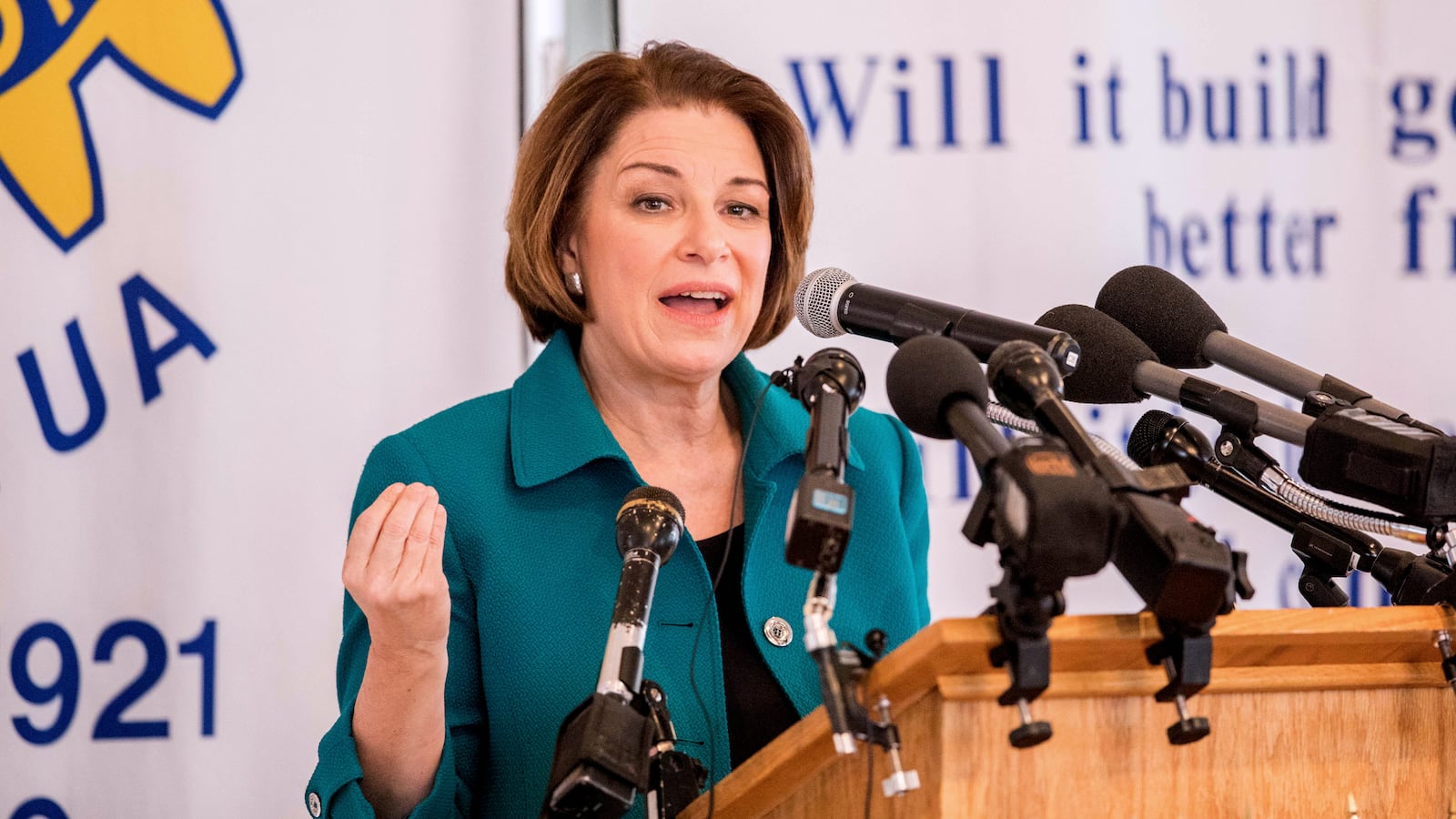As she’s climbed out of the longshot tier of the 2020 field, Sen. Amy Klobuchar (D-MN) has relentlessly sold herself to the country as a no-nonsense, hyper-competent alternative to a chaotic Donald Trump. To burnish that perception, she’s leaned heavily on her legislative record over three terms in the U.S. Senate—or “in the arena,” as she put it during the Democratic debate in Nevada this Wednesday.
Her pitch is so ubiquitous that you’ll find it everywhere from her stump speech to the primetime presidential debate stage to her supporters’ green t-shirts: “RANKED MOST EFFECTIVE DEMOCRATIC SENATOR,” the shirts read. “PASSED 100+ BILLS AS LEAD DEMOCRAT.”
Among the 100-plus bills Klobuchar has passed, however, there is one that still raises questions among some Democrats over how she operates as a legislator.
In the spring of 2015, as a Klobuchar-sponsored bill to fight human trafficking was on a glide path toward President Barack Obama’s desk, Democrats discovered the legislation included language on abortion that they considered toxic. And to their horror, they’d caught it too late. The bill had already reached the Senate floor, meaning that Republicans had the ability to force multiple votes on it, effectively making Democrats look like they were choosing between victims of trafficking and abortion rights. The mess was big enough that it ensnared the confirmation of Obama’s nominee for Attorney General, Loretta Lynch, with Majority Leader Mitch McConnell (R-KY) vowing not to move on it until the trafficking debacle was over.
In the eyes of many aides, Klobuchar made a difficult situation even more painful by crossing a line that is rarely traversed on Capitol Hill: publicly blaming staff.
Five years later, the episode has largely been forgotten. But against the backdrop of Klobuchar’s resurgent presidential campaign, those who witnessed it say that the process behind the trafficking bill has aged especially poorly, and stands out as a blemish in her otherwise staid 14-year tenure in the Senate, during which her bills to counter the opioid epidemic, mitigate the national backlog of rape kits, and improve the 911 emergency call system, among other things, have all become law.
The way the senator responded to a challenging moment for one of her marquee bills, according to five former staffers who spoke with The Daily Beast, encapsulates the problems she would face as both a presidential candidate and, potentially, president. The staffers were granted anonymity to speak candidly and without fear of retribution.
“You don’t throw people under the bus, period,” a former Senate staffer told The Daily Beast. “Even if you turn around and fire somebody, you still have to take responsibility for it publicly—that’s what leaders do.”
Another former Senate staffer told The Daily Beast that Klobuchar’s move to blame an aide sent a “terrible feeling” through the staff ranks of Capitol Hill, where the senator’s allegedly demeaning treatment of aides—detailed in several news reports since she launched her candidacy—has been an open secret for years.
“It’s consistent with her approach to staff as disposable, beneath her, expendable,” said the staffer. “She’s a very talented legislator, a sharp senator, she has a lot of things going for her—but she’s not good to staff, period, and this was an awful public example.”
In the spring of 2015, Klobuchar was halfway through her second term and had firmly established herself as a rising Democratic star in the chamber, already attracting buzz for higher office. But there was a prevailing sense at the time that she was missing a signature legislative win, according to a former Senate aide. A persistent knock on her back home was the perception she was prolific at passing small-ball bills but shrank away from bigger or more controversial topics. Human trafficking—an evil that had become subject to a turf war among senators eager to attack it—was a natural fit for Klobuchar, who had cultivated a law-and-order legislative focus after spending eight years as the prosecutor for Minnesota’s largest county.
Two years earlier, Klobuchar had co-sponsored the Justice for Victims of Trafficking Act with Sen. John Cornyn, a Texas Republican who was McConnell’s top deputy at the time. A central plank of the bill was a fund it created for victims of trafficking to access health care, legal aid, and other services, which would be paid for by fines placed on convicted traffickers and other criminals. The bill did not advance during that Senate session, and by the time it ended, Republicans had won back the Senate majority in the 2014 elections.
As the trafficking bill was set to be reintroduced at the beginning of the new session in 2015, Republicans sent a list of legislative alterations to Democrats on the Senate Judiciary Committee, the panel with jurisdiction over the bill. It did not include a reference to a significant change that they had made: that the fund for victims would be subject to the Hyde Amendment, which prohibits the use of federal funds to pay for abortion in most cases.
It was not until March 10—after the Judiciary Committee unanimously voted to advance the bill to the floor—that Senate Democrats broadly became aware of the abortion language. The office of Sen. Richard Blumenthal (D-CT) had reportedly found it in the bill’s text, hiding in plain sight and wrapped in tricky language that required several additional steps to discern that it had to do with the Hyde amendment. Pro-choice advocacy groups quickly got wind of it, and grew alarmed that the trafficking bill had morphed into a vehicle to expand restrictions on abortion access.
Democrats were mortified that such a significant provision had slipped past them. While the Republicans hadn’t flagged the change, no one seemingly had noticed it in the text of the legislation until it was too late. According to sources, the error was not seen as the fault of one senator in particular. However, there was scrutiny on Klobuchar, owing to the fact that it was legislation that she had co-sponsored for years.
Initially, Democrats complained the GOP had pulled a fast one on them. But Cornyn said their defense “presupposes that none of their staff briefed the senators on what was in the legislation, that nobody read a 68-page bill and that senators would vote for a bill, much less co-sponsor it, without reading it and knowing what’s in it.”
Later, an exasperated Sen. Dick Durbin (D-IL) would tell reporters, “What do you want me to tell you? We missed it!”
With the legislation already primed for a vote on the Senate floor, there was little way out for Democrats. At first, McConnell offered an amendment striking the abortion language, knowing full well it would not pass in the GOP-controlled chamber. Then, he staged votes on the bill—five of them—putting Democrats in the unenviable position of repeatedly voting down a noncontroversial bill to help trafficking victims, even if they had justifiable reasons for doing so. Ultimately, the GOP leader said he wouldn’t advance Lynch’s nomination as attorney general until the impasse was resolved, further infuriating Democrats and drawing the Obama White House into the mess.
The episode, which dragged on for six weeks, is remembered by Senate Democrats who experienced it as an especially discouraging and miserable time.
As public questions mounted over how Democrats could have missed the abortion language, Klobuchar tried to salvage the mess. On March 18, the senator spoke on the Senate floor for close to three hours, alternately urging her deadlocked colleagues to look past “the blame game” and reading passages from Half The Sky, a book about human trafficking.
The next day, Klobuchar’s office issued a statement to the Associated Press.
“A staff member who reviewed the reintroduced bill had seen the Hyde provision in the bill but did not inform the senator. The senator was not aware that the provision was included until last Monday,” said Klobuchar’s office. “The senator takes responsibility for the work of her office and missing the provision and she is focused on moving forward to find a way to fix the bill and protect victims of trafficking.”
In the demanding and high-pressure environment of Capitol Hill, many staffers come to expect occasionally harsh or even unfair treatment from their bosses—in private. To see a senator point the finger at a staffer in a public way—for an error that many could claim and that ended up consuming the Senate, no less—was chilling, recalled one former aide.
Reflecting on it years later, a Klobuchar campaign staffer stressed that the senator “said at the time that she took full responsibility for missing the provision” and was “focused on finding a way to fix the bill and it was ultimately signed into law."
At a closed-door lunch at the time, however, some Democratic lawmakers were reportedly frustrated that Klobuchar didn’t initially take responsibility for the mistake. The impression of a former Senate staffer was that “Klobuchar’s reaction was more to save face for herself than to dig out of the problem and have some kind of effort to get back to neutral.”
As the dispute dragged on, Politico reported that Democratic leaders kept Klobuchar appraised of negotiations, but made Sen. Patty Murray (D-WA) a point person on dealing with Republicans, partially out of wariness that Klobuchar was too eager to strike a deal in order to move past the ordeal.
The compromise that was ultimately brokered on April 21 changed little from a policy standpoint but allowed both sides to save face politically: the fines collected for the victims’ fund would not go toward health care, while federal funds that were already subject to the Hyde Amendment restrictions on abortion could.
Klobuchar did claim credit for that solution, later saying she was sitting in her car in a cornfield during a trip across her state when the idea to establish two separate funds hit her. At the time, she said she called Sen. Harry Reid (D-NV), then the Democratic minority leader, and other senators in both parties to take their temperature on the bargain. Three weeks later, the compromise was finalized on Capitol Hill.
Democrats were relieved to put the issue behind them but hardly any viewed it as a victory. In a statement on the end of the impasse, the pro-choice group NARAL framed the agreement as a loss for their cause but specifically thanked Murray and Reid for their work in “standing up for victims of trafficking,” in addition to “others.” They left out Klobuchar’s name.
Since launching her presidential campaign last year, Klobuchar’s image as a battle-tested legislator and capable compromiser—someone who has been in the “arena,” as she puts it, invoking a famous Teddy Roosevelt quote—has been her sword and shield on the primary trail.
That was on full display during Wednesday night’s Democratic debate in Las Vegas, when a rival, former South Bend mayor Pete Buttigieg, questioned whether Klobuchar’s Senate experience entailed readiness for the presidency.
“I have passed over 100 bills as the lead Democrat since being in the U.S. Senate,” she fired back. “You have not been in the arena doing that work. You've memorized a bunch of talking points.”
During the campaign, Klobuchar has pointed to her efforts on trafficking to make the case she is an effective policymaker. “From leading the fight to win a 48-hour hospital stay for new moms and their babies to passing landmark legislation to end human trafficking,” reads a section on her campaign website, “Amy has the track record needed to build a better future for our country.”
But Klobuchar does not talk about the bill frequently on the campaign trail and has faced hardly any questions about it either. For those who watched her in the “arena,” however, memories of that episode have not yet faded.
“It speaks more to how she responds to adversity than her ability to get things done,” said a former Senate aide. “She’s very sharp, she can schmooze. It’s just what happens when things go off the rails.”







